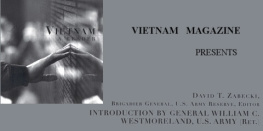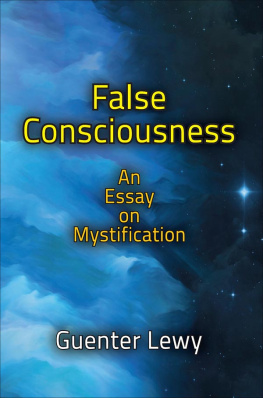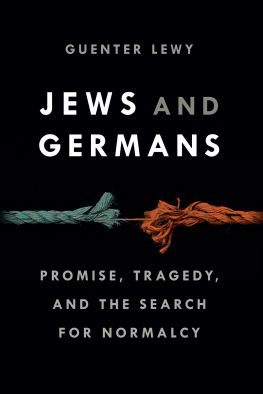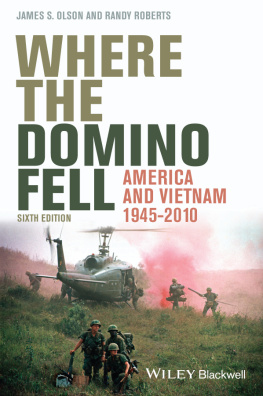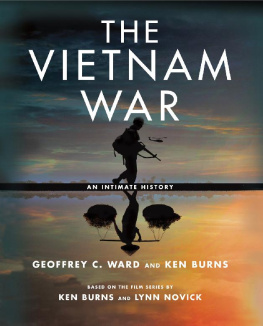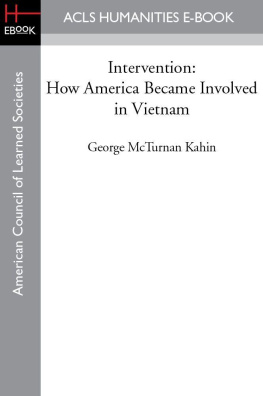Lewy - America in Vietnam
Here you can read online Lewy - America in Vietnam full text of the book (entire story) in english for free. Download pdf and epub, get meaning, cover and reviews about this ebook. City: USA;New York, year: 1981;2009, publisher: Oxford University Press, genre: Politics. Description of the work, (preface) as well as reviews are available. Best literature library LitArk.com created for fans of good reading and offers a wide selection of genres:
Romance novel
Science fiction
Adventure
Detective
Science
History
Home and family
Prose
Art
Politics
Computer
Non-fiction
Religion
Business
Children
Humor
Choose a favorite category and find really read worthwhile books. Enjoy immersion in the world of imagination, feel the emotions of the characters or learn something new for yourself, make an fascinating discovery.

America in Vietnam: summary, description and annotation
We offer to read an annotation, description, summary or preface (depends on what the author of the book "America in Vietnam" wrote himself). If you haven't found the necessary information about the book — write in the comments, we will try to find it.
America in Vietnam — read online for free the complete book (whole text) full work
Below is the text of the book, divided by pages. System saving the place of the last page read, allows you to conveniently read the book "America in Vietnam" online for free, without having to search again every time where you left off. Put a bookmark, and you can go to the page where you finished reading at any time.
Font size:
Interval:
Bookmark:
Guenter Lewy

Oxford University Press
Oxford London Glasgow
New York Toronto Melbourne Wellington
Nairobi Dar es Salaam Cape Town
Kuala Lumpur Singapore Jakarta Hong Kong Tokyo
Delhi Bombay Calcutta Madras Karachi
Copyright 1978 by Guenter Lewy
First published by Oxford University Press, New York, 1978
First issued as an Oxford University Press paperback, 1980
Library of Congress Cataloging in Publication Data
Lewy, Guenter, 1923
America in Vietnam.
Includes index.
1. Vietnamese Conflict. 19611975. 2. United
StatesHistory1945I. Title.
DS558.L48 959.7043373 77-26204
ISBN-13 9780195023916
ISBN-13 9780195027327 pbk.
Printed in the United States of America
Contents
This book began as an effort to find answers to some of the factual uncertainties and moral ambiguities created by the war in Vietnam. It was completed some five years later amid reports of a new human tragedy in the makinguncounted hapless refugees drowning on the high seas and thousands of others seeking a new home in a world all too indifferent to their suffering.
The desirability of bringing to bear more light, rather than heat, on the discussion of the American involvement in Vietnam has been apparent for a long time, but somewhat paradoxically serious interest in this emotionladen subject appears to have declined just as reliable information on events in Indochina is finally becoming available. Under provisions of Executive Orders 10501 and 10816, promulgated by President Eisenhower, and Executive Order 11652, issued by President Nixon on 8 March 1972, the secretaries of the military services have discretionary authority to permit qualified researchers from outside the executive department access to classified defense information. Whether out of unacquaintance with this provision of the law or for lack of interest in a subject many Americans would prefer to forget, no scholar until now has availed himself of this rich, and indeed indispensable, source.
This book is the first work dealing with the Vietnam war which, in addition to standard sources, makes use of the classified records of the U.S. Army, Air Force and Marine Corpsafter-action reports of military operations, field reports and staff studies of the pacification effort and the Phoenix program, intelligence reports, investigations of war crimes, and the like. As one would expect, the picture that emerges is novel and occasionally startling in both fact and significance.
The first six chapters seek to provide a reliable empirical record of American actions in Vietnam and, in the process, to clear away the cobwebs of mythology that inhibit the correct understanding of what went onand what went wrongin Vietnam. In the interest of a treatment in depth, the scope of this study has been limited to Vietnam proper. The complex story of the growing involvement of Laos and Cambodia in the Indochina conflict requires a separate, detailed account and is therefore touched upon here only insofar as it relates most directly to developments in Vietnam.
It is among actions takenor not takenby the U.S. and its allies in Vietnam that the explanation for the course of events and the final outcome of the war has to be found. Back in 1962 President Kennedy is supposed to have called the infiltration of communist cadres from the North a built-in excuse for failure in the South. In the same way, the collapse of the South Vietnamese army in the face of still another large-scale invasion from the North, preceded by drastic cuts in aid to South Vietnam imposed by the U.S. Congress after the Paris Agreement of 1973, has tempted both the last leaders of South Vietnam and most of the U.S. military to avoid facing the fundamental reasons for this defeat. The South Vietnamese, and indeed American soldiers earlier, it is argued, could have won the war had they not been frustrated by political constraints in the U.S. and the collapse of the home front. There is no denying that the reductions in U.S. aid did weaken South Vietnams ability to resist the well-equipped northern divisions, and war-weariness and antiwar sentiment in America were widespread. However, the nonachievement of U.S. goals in Vietnam had other and deeper causes, prominently including a failure to understand the political and social dynamics of a revolutionary war. To ignore these basic causes in favor of a facile stab-in-the-back legend will give rise to more illusions and prevent the learning of the necessary and correct lessons of the Vietnam debacle.
To a large number of Americans the Vietnam war represents not only a political mistake and national defeat but also a major moral failure. The catalog of evils with which the United States is burdened includes the indiscriminate killing of civilians, the assassination and torture of political adversaries, the terror-bombing of North Vietnam, duplicity about it all in high places and much else. For many younger people, in particular, America in Vietnam stands as the epitome of evil in the modern world; this view of the American role in Vietnam has contributed significantly to the impairment of national pride and self-confidence that has beset this country since the fall of Vietnam.
It is the reasoned conclusion of this study, developed especially in chapters 711, that the sense of guilt created by the Vietnam war in the minds of many Americans is not warranted and that the charges of officially condoned illegal and grossly immoral conduct are without substance. Indeed, detailed examination of battle field practices reveals that the loss of civilian life in Vietnam was less great than in World War II and Korea and that concern with minimizing the ravages of war was strong. To measure and compare the devastation and loss of human life caused by different wars will be objectionable to those who repudiate all resort to military force as an instrument of foreign policy and may be construed as callousness. Yet as long as wars do take place at all it remains a moral duty to seek to reduce the agony caused by war, and the fulfillment of this obligation should not be disdained. I hope that this book may help demonstrate that moral convictions are not the exclusive possession of persons in conscience opposed to war, and that those who in certain circumstances accept the necessity and ethical justification of armed conflict also do care about human suffering.
The Vietnam experience was always more complex than ideologues on either side could allow. The reality of the Vietnam war was composed of myriad events; the intricacy and variety of the scene was such that visiting hawks and doves could each observe, investigate and leave, assured of the wisdom of the view each held upon arrival. Like pieces in a kaleidoscope, the facts of the Vietnam war could, and still can, be put together in a multitude of configurations which in turn lead to different political and moral judgments and conclusions. I make no claim to have overcome all of the difficulties which confront the search for the truth about Vietnam. I do assert that the previously untapped sources at my disposal have enabled me to clarify some of the most important, hitherto contested, issues of the war, and that my major findings are supported by evidence which stands up under critical scrutiny. Sections of the epilogue, I should acknowledge, dealing with such questions as whether the U.S. could have won in Vietnam, are necessarily in large measure speculative. That part of the book will have to be judged by different criteria, and I shall not be displeased if future events were to prove my reflections to have been unduly pessimisticespecially my observations concerning the political impact of the Vietnam disaster at home and abroad.
Font size:
Interval:
Bookmark:
Similar books «America in Vietnam»
Look at similar books to America in Vietnam. We have selected literature similar in name and meaning in the hope of providing readers with more options to find new, interesting, not yet read works.
Discussion, reviews of the book America in Vietnam and just readers' own opinions. Leave your comments, write what you think about the work, its meaning or the main characters. Specify what exactly you liked and what you didn't like, and why you think so.


